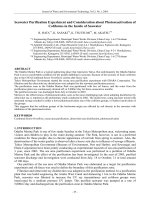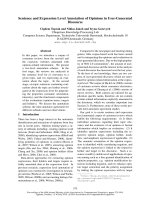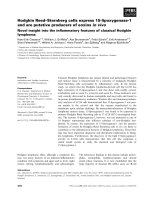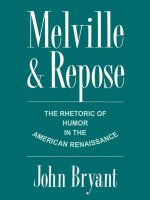- Trang chủ >>
- Khoa Học Tự Nhiên >>
- Vật lý
melville and repose the rhetoric of humor in the american renaissance oct 1993
Bạn đang xem bản rút gọn của tài liệu. Xem và tải ngay bản đầy đủ của tài liệu tại đây (23.38 MB, 331 trang )
Melville and Repose
This page intentionally left blank
MELVILLE
AND
REPOSE
The
Rhetoric
of
Humor
in the
American Renaissance
John
Bryant
New
York
Oxford
OXFORD
UNIVERSITY
PRESS
1993
Oxford University
Press
Oxford
New
York Toronto
Delhi
Bombay Calcutta Madras Karachi
Kuala
Lumpur Singapore Hong Kong Tokyo
Nairobi
Dar es
Salaam Cape Town
Melbourne Auckland Madrid
and
associated companies
in
Berlin
Ibadan
New
material copyright
©
1993
by
Oxford University
Press,
Inc.
Published
by
Oxford University
Press,
Inc.,
200
Madison Avenue,
New
York,
New
York
10016
Oxford
is a
registered trademark
of
Oxford University Press
All
rights reserved.
No
part
of
this publication
may be
reproduced,
stored
in a
retrieval system,
or
transmitted,
in any
form
or by any
means,
electronic, mechanical, photocopying, recording,
or
otherwise,
without
the
prior permission
of
Oxford University
Press.
Library
of
Congress Cataloging-in-Publication Data
Bryant,
John,
1949-
Melville
and
repose
:
the
rhetoric
of
humor
in the
American Renaissance
/
John
Bryant.
p.
cm.
Includes bibliographical references
and
index.
ISBN
0-19-507782-2
1.
Melville, Herman, 1819-1891—Humor.
2.
American
literature—19th
century—History
and
criticism.
3.
Humorous
stories,
American—History
and
criticism.
4.
Rhetoric—United States—History—19th century.
5.
Comic, The,
in
literature.
6.
Narration (Rhetoric)
I.
Title.
PS2388.S2B79
1993
813'.3—dc20
92-46150
Selections
from
Chapter
1
were published under
the
title
"Melville's
Comic
Debate"
in
American Literature
55:2, copyright 1983 Duke University
Press,
and are
reprinted with permission
of the
publisher. Other portions
of
that chapter
first
appeared
in
"Melville's
Picturesque,"
in
Savage Eye,
ed.
Christopher Sten (Kent, Ohio,
1991),
and are
reprinted with permission
of The
Kent State University Press. Part
of
Chapter
6 was
previously
printed
in "
'Nowhere
a
Stranger': Melville
and
Cosmopolitanism," Nineteenth-Century Fiction
39:3
(December 1984),
pp.
275-291,
copyright
1984
by the
Regents
of the
University
of
California. Selections
from
this chapter were also published under
the
title
'
'Citizens
of a
World
to
Come: Melville
and the
Millennial
Cosmopolite,"
in
American Literature
59:1,
copyright
1987
Duke University Press; they
are
reprinted here
with
permission
of the
publisher.
The
discussion
of
"Melville's
L-Word"
in
Chapter
8 was first
recorded
in
The
New
England Quarterly (March 1990),
and
Chapter
13
originally appeared
as
"Allegory
and
Breakdown
in
The
Confidence-Man," Philological Quarterly
65:1
(Winter 1986). Both
are
reprinted with permission
of
the
publishers. Selections
from
the
Typee
manuscript
in
Chapters
7, 8, and 9 are
quoted from
the
Gansevoort-
Lansing
Collection, Rare Books
and
Manuscripts Division,
The New
York Public Library, Astor, Lenox
and
Tilden Foundations.
2
4 6 8 9 7 5 3 1
Printed
in the
United
States
of
America
on
acid-free
paper
For
Ginny,
Emma,
and
Eliza
This page intentionally left blank
Preface
In
April 1890, Harper's Magazine published
an
encyclopedic article
by
Henry Clay
Lukens
on
"America's
Literary
Comedians,"
which included
one
eccentric detail:
Tucked into
its
list
of
midcentury humorists
of '
'rare
talent''
was the
name Herman
Melville.
1
Melville, then
a
retired customs inspector living comfortably
in New
York City,
had not
published
a
piece
of
prose
fiction in
thirty-five
years. Eighteen
months later
he was
dead, remembered
if at all for
Typee
and
other
sea
romances.
The
Lukens piece adds
a
ripe
irony
to
Melville's
final
years. Here
is
America's
principal tragic voice ignored,
if not
forgotten, even misnamed
"Henry"
in one
obituary, identified
as a
mere
"literary
comedian."
But the
double irony
is
that
Lukens's designation
is not
"mere."
Melville
was a
humorist
in the
deepest sense
of
the
term,
and
would
not
have objected
to
this seemingly monumental under-
estimation
of his
talent.
He saw
himself
as he saw the
world:
"half
melancholy,
half
farcical" (Log, 549).
Nor
would Melville's early contemporaries have
de-
murred. Although Melville
was not a
professional humorist like
T. B.
Thorpe
or
Oliver Wendell Holmes,
he
used humor
as
would
any
professional writer hoping
to
make
a
living.
And
beyond this,
he
used humor because
it was a
metaphysical
and
aesthetic imperative.
If
art
must strive
to
balance head
and
heart,
and if it
works
to
engage readers
in
what,
to
paraphrase Melville,
may be
called
the
deep thought
of
laughter, then
humor's relevance
is
undeniable.
Of
course,
we may
argue that Melville
was
constitutionally unprepared
to
adopt this Romantic code, that
he
failed
in the
mar-
ketplace because
he
refused
to
accept
its
strictures,
and
that
he
failed even more
when
like
Poe he
tried
to
force humor
in his
work.
The
French
critic
Philarete
Chasles,
an
early
and
close reader
of
Mardi, declared Melville
a
"Rabelais
without
gaiety,
a
Cervantes without grace,
and a
Voltaire without
taste."
2
But
Chasles's
final
message
is
that Melville
is
less
a
failed humorist than
one
struggling
for the
proper accommodation
of
variant humors. Other critics aligned Melville with such
comic greats
as
Burton
and
Sterne,
who
perhaps shared Melville's precariously
poised
sensibility.
Melville
was not the
melancholiac
we
would like
to
think him;
indeed,
humor
was
fundamental
to his
rhetoric, intrinsic
to his
sense
of
Being
and
self,
crucial
to the
fabric
of the
nation.
In a
very real sense, humor takes
us to the
heart
of
Melville's condition
as an
artist.
viii
Preface
Part
I of
this book supports these unorthodox claims
by
exploring
the
comic
conventions
and
rhetorical models available
in
Melville's culture. Overall, these
contextual
chapters focus
on a
long-standing cultural
"debate"
between integrative
and
subversive comic modes
of
amiable humor
and
what
I
call
the
rhetoric
of
deceit.
Each mode presumes
its own
ontology (benevolence versus misanthropy);
its own
ethics
(faith
versus doubt);
its own
rhetoric (sincerity versus unreliability).
The
problem
for
writers
of the
American Renaissance
was how to
resolve this
comic debate
by
incorporating humor
and
satire
in
ways that would
satisfy
artistic
and
social needs. They were
in
search
of a
voice that could contain selfhood
but
also prod
an
audience immersed
in the
problems
of the
emergent democracy.
The
development
of
Melville's narrative voice
is
inextricably bound
to his
evolving
comic sensibility,
and
that evolution
is in
turn
shaped
by
certain
"facts":
that
humor (apart
from
satire)
was
fundamental
to
Melville's romantic sense
of
being;
that
an
"aesthetics
of
repose"
was
equally fundamental
to
this idea
of
humor;
that
America required
a
subordination
of
satire
to
humor
for its
comic
and
political
survival;
and
that
to
achieve aesthetic repose Melville experimented with various
narrative strategies
shifting
from
Types
to
Moby-Dick
to The
Confidence-Man.
Melville concocted
his own
resolution
of the
comic debate
by
drawing upon
the
amiable
and
picturesque styles
of
Irving
and
Hawthorne,
by
experimenting with
forms
of
unreliability typical
of Poe and
Thorpe,
and by
synthesizing both ironic
and
reposeful modes through
his own
notion
of
cosmopolitanism. Melville's
humor
also takes
us to the
heart
of the
condition
of the
artist
and
reader
in
America.
The
problem
in
studying
the
comic
is the
tendency
to
wear
the
subject like
a
chip. Although irony
is the
preferred mode
of
expression
in
"The
Modern
Age of
the
Absurd,"
and
though Wylie Sypher argues that comedy
"can
tell
us
many
things about
our
situation even tragedy
cannot,"
3
the
fact remains that
the
analysis
of
humor
is, at
best,
a
secondary concern.
At
worst, critics
place
humor
on a
patronizing pedestal,
too
good
to be
ruined
by
prolonged study. Nothing spoils
a
good laugh more than discourse upon
it. As
James
Cox
reminds
us,
"the
fate
of
humor"
is
that
it is
taken
to be
"mere."
4
Humor remains marginalized, even among
Americanists, despite
the
remarkable efforts
of
Constance Rourke, Walter Blair,
and
Hamlin Hill.
As a
consequence,
any
study
of
humor—especially
one on
such
a
solemn
figure as
Melville—inevitably includes
an
apology like
the one you are
reading
now.
But
just
as
feminists have awakened
us to the
power
of
sentimental
fictions,
so
too
might
we
legitimize
"mere"
humor
and
discover
new
vitalities
in
old
places.
Melville included.
My
larger purpose
in
writing Melville
and
Repose
is to
demonstrate
a
version
of
what
I
call
"pluralistic
historicism."
By
pluralism,
I do not
mean
to
invoke
the
current usage equating
it to
multiculturalism—although that
is a
valid consideration
and
one
particularly relevant
(in the
form
of
cosmopolitanism)
to a
significant
phase
of
Melville's work—but rather
I
mean
a
synthesis
of two
seemingly divergent
approaches
to a
text,
its
creation
and its
reception,
which intersect briefly
but
vitally
at
those moments when
an
Author surrenders
to a
Reader. Often, such surrendering
is
just
as
effective
for the
author
as it is for the
reader
in
that
a
literary expression
will
serve
as
both
a
cogent articulation
of
one's
being
as
well
as a
persuasive means
Preface
ix
of
awakening
readers
to the
conditions
of
their existence.
But
just
as
often,
it can
lead
to
disastrous compromises. Surrender occurs
the
moment
an
author projects
a
reader
and
begins
to
compose.
Here,
the
effusions,
restraints,
and
self-censorings
begin. Further expansions
or
repressions
of
self
and
reader occur even
as a
text,
frozen
in
print,
is
altered
from
edition
to
edition.
How
writers write reveals
the
mechanisms
and
complex vectors
of
force that shape their surrender.
We
also
see
how
ideologies
emerge
and
evolve.
And
given
that
a
writer's
writing
is
never
fully
done,
the
writing
process
and the
author's relation
to
ideology
are
always
inchoate.
Writers
are
always
"essaying."
At the
same time,
an
author
creates
structures that
ask, demand, tease,
or
trick
us as
readers
to
"play
along"
with
the
text. This vital
relation
to the
reader,
then,
is as
exploratory
and
experimental
as the
relations
to
self
and
ideology.
Any
critical approach
that
attempts
to
freeze either
of
these sides
of
the
author's creative
act
(both
his or her
writing
and our
reading) necessarily
misrepresents
the
"facts"
of the
literary
process.
For
Melville, writing
and
reading
were inseparable components
of his
creative act; hence,
any
historicist approach
must
in
equivalent fashion
be
pluralistic;
it
must enlighten
the
rhetorical conditions
of
the
author's creativity.
Writers,
Texts,
and
Readers evolve. Critics seek
to
determine what
these
mean,
even
to the
extent
of
trying
to
retrieve
an
author's intentions
and
assessing what
successive generations
of
readers might understand. Given these goals, pluralistic
historicism,
as it
focuses
on the
interactions between writer
and
readers,
requires
a
renewed critical imperative:
The
Author exists.
One
need
not
rehearse
the
past
50
years
of
criticism
to
note
that
successive waves
of the New
Criticism, struc-
turalism,
and
deconstruction have
so
privileged Language itself over Author that
biography
and
historicism have been largely devalued. Most disheartening,
I
would
think,
for the
neglected traditional historicist
is
that
the
advent
of the New
Historicism, which,
in its bid to
contextualize literary study should
in
some sense
revalorize
the
Author,
in
fact
recapitulates poststructuralist assumptions concerning
the
irrelevance
of
individual
creators.
For
those such
as
myself
who
hope
to
draw upon
the
best
of the
traditional
and the
new,
it is
equally disheartening
to
find
that
new
historicist approaches
in
their pursuit
of a
"political
unconscious-
ness"
too
often
rely upon that weakest
of
historicist methodologies,
or
what
I
call "the fallacy
of
parallel
developments"
wherein perceived homologies between
social
and
literary structures stand
in
substitution
for
harder evidence connecting
milieu
to
text. What
is
deleted
in
this
form
of
thinking
are
studies
of
authors
whose conscious
or
even accidental acts
of
creation constitute
the
"event"
that
convert
a
social force into text.
In
order
to
avoid
the
fallacy
of
parallel structures
and
focus more upon
the
transformative
"person
in
between,"
historicists need
to
reconsider
those arenas
of
critical inquiry
now
generally denigrated—causation
and
intentionality—which while they
may
lead
to
speculation nevertheless focus
our
attention
on the
very initializing force that makes Language
and
Text
pos-
sible—once again,
the
Author.
My
privileging
of the
Author
is
likely
to
draw hurrahs
from
the
"single
author
societies"
and
hoots
from
theorists.
But
neither response
is
particularly appro-
priate.
Studying
an
author simply
for the
sake
of it is as
unfulfilling
as
discovering
utterly
predictable convergences
(or
divergences) between
a
unique
text
and a
x
Preface
general theory
of
Text
(or of
Context).
Of
course, what
I
offer
here
is,
inevitably,
"my"
Melville,
the
product
of
objective research
and
unavoidable subjectivities
of
mind.
But it is, I
hope,
a
Melville that
can
converse with
"your"
Melville,
and
one to
which
we
"feel
the
tie."
It is a
Melville
not so
much
framed
by
theories
of
language
or
culture
as it is
revealed through hypotheses concerning
the
development
of a
career,
hypotheses that
in
conjunction with other hypotheses
about other creative careers
may
help
us
eventually derive
a
theory
of
creativity
in
America.
In
writing this book,
I
have tried
to
give equal measure
to
both creation
and
reception,
and
where evidence exists,
as it
does with
Typee,
I
have even gone
so
far
as to
suggest
a
redefinition
of
what
a
text might
be. In the
pursuit
of
something
called
"repose,"
I
have
found
myself meddling with metaphysics, aesthetics, ethics,
and
rhetoric
as
well
as the
minutiae
of
manuscripts
and
textual variants;
I
have
interconnected letters
and
reviews
as
well
as
literary
and
family history.
I
have
become more
of a
cultural philologist exploring
a
variety
of
materials
to
retrieve
for
us
today
earlier
meanings
of
such words
as
geniality, picturesque,
and
cos-
mopolitan.
I
have
as
well explored
the
interpenetrations
of
Melville's
psychology,
politics,
and
sexuality. This
is a
long book—comprehensive more perhaps
in its
intent
than actual execution,
of
course,
but as
someone once complained,
I
have
heard
the
printer's devil knocking
at the
door
and
must surrender myself
to
readers.
Such
closure brings silence
and the
worry
of
necessary incompletion,
a
feeling
much
like
the
tense
repose
Melville
felt
and
transformed into
art.
And
that complex
unitary
feeling, more than
any
effort
at
critical pluralism,
may be the
truest link
I,
or any
critic,
may
have
to
Melville.
I
would like
to
acknowledge
the
many
friends
who
have helped
me
with this
project.
My
training
in
critical thinking
and
writing began with
my
parents, John
and
Doris Bryant,
and
continued with Norman Maclean
in the
College
of the
University
of
Chicago;
I
have tried
to
follow
his
injunction
to
put' 'pressure
on my
prose,"
but I am
sure some passages (including this
one)
would have made
him
wince.
A
primordial version
of
this book began
as a
dissertation
at the
same
university
under Hamlin Hill
and
James
E.
Miller,
Jr. At
that time, Walter Blair
was
gracious enough
to
interrupt
his
active retirement
from
time
to
time
to
counsel
me on
research technique
and,
again,
prose.
His
characterization
of a
scholar
as
one
who
will
"go to the
ends
of the
earth
to find and
verify
a
fact"
has
made
me
a
better
(but
exhausted) person. Others have read chapters
and
provided encour-
agement: Hennig Cohen, Philip Gura, Stanton Garner, Harrison Hayford, Robert
Milder, Merton
M.
Sealts,
Jr.,
and
John Wenke.
I
would also like
to
thank former
colleagues
at the
Pennsylvania State University
who
provided valuable critiques:
Eric Birdsall, Robert Burkholder, Mary DeJong, Robert Hudspeth,
and
Philip
Young.
Let me
also thank
my
colleagues
at
Hofstra University: Dana Brand, Stanley
Brodwin, Thomas Couser, Allan Davis, Rhoda Nathan, Ruth
Prigozy,
Robert
Sar-
gent,
and Lee
Zimmerman, whose
careful
critiques
and
earnest encouragement have
been invaluable.
My
daughters, Emma
and
Eliza, have grown
up
with this book;
they
have nurtured
it and me
more deeply
than
they know. Several sources provided
funding:
the
Institute
for
Arts
and
Humanistic Studies,
the
Faculty
Scholarship
Preface
xi
Support Fund,
and
Liberal Arts Research Fund—all three
of
Penn State—as well
as
the
National Endowment
for the
Humanities
and the
Newberry Library.
But the
one
foundation that supported
me and
this project
from
beginning
to end is my
friend
and
wife
Virginia Blanford, whose humor, depth,
and
creativity circle
me
round.
Scarsdale, N.Y.
J. B.
January
1993
This page intentionally left blank
Contents
Abbreviations
for
Frequently Cited Sources,
xvii
1.
A
Great
Intellect
in
Repose,
3
Humor
and
Being,
6
Melville's Aesthetics
of
Repose,
8
Melville's Rhetoric:
Voicing
the
Voiceless,
19
Melville
and the
Reader: "Lord when shall
we be
done changing?,"
27
I
AMERICA'S COMIC DEBATE
2.
America's
Repose,
33
Britain's Amiable Tradition,
34
Amiability
on
Native Ground,
41
3. The
Example
of
Irving,
52
Irving's Comic Debate,
53
Salmagundi
and
Some Versions
of
the
Bachelor,
55
A Rip in the
Canvas: Irving'
s
Picturesque,
63
Irving's Goldsmith
and the
Rhetoric
of
Geniality,
66
4.
Playing Along: America
and the
Rhetoric
of
Deceit,
70
The
Deep Thought
of
Laughter,
70
A
Veracious History
of
Lying,
72
The
Lie of our
Land: Forms
of
Comic Lying,
82
5. E. A. Poe and T. B.
Thorpe:
Two
Models
of
Deceit,
88
Poe's Humor,
88
Thorpe's
Big
Bear,
100
6. The
Genial Misanthrope: Melville
and The
Cosmopolitan Ideal,
109
Melville's Cosmopolite,
110
Europe's Cosmopolite:
"At
Home
in
Every
Place,"
112
xiv
Contents
America's
Con Man
Cosmopolite: "Nowhere
a
Stranger,"
116
Herman Melville: "Diogenes Masquerading
as a
Cosmopolitan,"
127
II
RHETORIC
AND
REPOSE
TYPEE
7. The
Anxieties
of
Humor,
131
Reliability
and the
Amiable
Rebel,
134
Tommo's Picturesque,
139
Tommo's Amiable Eden,
140
8.
Typee
in
Manuscript,
146
Drama
and
Restraint,
146
Finding
Voice: Transcription, Transformation,
and
Translation,
152
Forging
Ideology: Melville
and '
'Little Henry,''
157
9.
Tommo's Rhetoric
of
Deceit,
161
Tattoo, Taboo,
and
Cannibalism: Forms
of
Conversion,
162
Tommo
Prometheus,
165
Baffled
Scientist
and Con Man
Revivalist,
174
Rover
and
Cosmopolite,
178
MOBY DICK
10.
Ishmael: Sounding
the
Repose
of If, 186
Ishmael's Initiation: Narcissist
and
Cosmopolite,
187
Knowledge
and
Voice,
192
Finding
Voice: Ishmael's Genial Desperation,
199
Pondering
Repose,
204
11.
Ahab: Personifying
the
Impersonal,
209
"What Cozening, Hidden Lord
and
Master,"
212
Displaced
Fools,
219
On the
Margin
of the
Maelstrom,
228
12.
Melville's
Comedy
of
Doubt,
230
Melville's Reader: Partner, Victim, Participant,
231
Allegory
and
Breakdown,
234
THE
CONFIDENCE-MAN
13.
Comic Debates:
The
Uses
of
Cosmopolite,
244
Contents
xv
Pitch:
The
False Misanthropist,
245
Charlie Noble:
The
False Genialist,
250
Charlemont:
The
Genial Misanthrope,
261
Coda: Something
Further,
265
Notes,
269
Index,
299
This page intentionally left blank
Abbreviations
for
Frequently
Cited
Sources
CM:
Herman Melville.
The
Confidence-Man:
His
Masquerade.
Ed.
Harrison Hay-
ford,
Hershel Parker,
and G.
Thomas
Tanselle.
Evanston
and
Chicago: North-
western University
and The
Newbeny Library, 1984.
Companion:
John Bryant,
ed. A
Companion
to
Melville Studies. Westport,
CT:
Greenwood
Press,
1986.
Letters: Merrell
R.
Davis
and
William
H.
Gilman, eds.
The
Letters
of
Herman
Melville.
New
Haven: Yale University
Press,
1960.
Log:
Jay
Leyda,
ed. The
Melville Log:
A
Documentary
Life
of
Herman Melville,
1819-1891.
Reprint with supplement.
New
York: Gordian Press, 1969.
M:
Herman Melville. Mardi
and a
Voyage
Thither.
Ed.
Harrison Hayford, Hershel
Parker,
and G.
Thomas Tanselle. Evanston
and
Chicago: Northwestern University
and
The
Newberry Library, 1970.
Marginalia:
Wilson Walker Cowen. Melville's Marginalia. Ph.D. dissertation.
Harvard
University, 1965.
MD:
Herman Melville. Moby-Dick,
or The
Whale.
Ed.
Harrison Hayford, Hershel
Parker,
and G.
Thomas
Tanselle.
Evanston
and
Chicago: Northwestern University
Press
and
Newberry Library, 1988.
Piazza
Tales: Herman Melville.
The
Piazza Tales,
and
Other Prose Pieces,
1839—
1860.
Ed.
Harrison Hayford, Alma
A.
MacDougall,
and G.
Thomas Tanselle.
Evanston
and
Chicago: Northwestern University
Press
and
Newberry Library,
1987.
Poems: Herman Melville. Collected Poems
of
Herman Melville.
Ed.
Howard
P.
Vincent.
Chicago: Hendricks House, 1946.
xviii
Abbreviations
for
Frequently Cited
Sources
Sealts: MertonM. Sealts,
Jr.
Melville's Reading. Rev.
ed.
Columbia,
SC:
University
of
South Carolina Press, 1988.
T:
Herman Melville.
Typee:
A
Peep
at
Polynesian
Life.
Ed.
Harrison Hayford,
Hershel Parker,
and G.
Thomas Tanselle. Northwestern University
and
Newberry
Library, 1968.
Melville
and
Repose
There
is
laughter
in
heaven,
and
laughter
in
hell.
And
a
deep thought whose language
is
laughter.
—Mardi
Silence
is the
only
Voice
of our
God
. . how can a man
get
a
Voice
out of
Silence?
—Pierre
1
A
Great
Intellect
in
Repose
"The
first
duty
of a
critic
is to
remember that, behind every book there
is a
man—or
rather, that there
is a man in
every
book."
Fitz-James O'Brien,
one of
Herman Melville's friendlier literary associates, wrote this critical imperative
as
part
of a
general assessment
of
Melville's career occasioned
by the
publication
in
1857
of The
Confidence-Man.
In
all,
O'Brien
was
pleased with
his
friend's progress.
He
was
controlling earlier excesses
and had a
reasonable claim
to
becoming Amer-
ica's
great
"prose-poet." "Behind"
or
rather
"in"
Melville's books
was a
creative
"man"
whose only errors were
on the
side
of the
Imagination. This
was
surely
a
"personality,"
O'Brien concluded, that would
"inspire"
the
age.
1
The
poignancy
of
O'Brien's
critique lies
in the
irony
of
this misplaced prophecy,
for in
1857
Melville
was on the
verge
of
professional failure,
and if he
inspired
any
age,
it
was not his but
ours.
Nor
does O'Brien seem cognizant
of
what critics
now
perceive
to be the
failure—whether
willful
or
involuntary—of
Melville's
form
and
language.
O'Brien's
critical assumptions seem fatally nai've.
The New
Criticism struggled
mightily
to
purge literary analysis
of
such biographical orientations,
and
more
recently
deconstructionists deny
the
relevance
of any
authorial presence
in a
text.
Even
New
Historicists,
who
study texts
in
context, ignore authorial intention
for
broader notions
of a
"political unconscious."
2
Few
modern critics
are
concerned
with
the
person behind
a
text. O'Brien exhibits
not
even
an
embryonic hint
of
modernism;
he
does
not
look
to
literature
for
unified
effects,
well-wrought urns,
metaphors, metonyms, linguistic crises, social negotiations,
or
cultural symbols.
He
focuses solidly
on
that subjective entity that objectivists cringe
to
hear invoked—
personality. O'Brien assumes that
an
artist's voice
is an
actual moral presence,
not
a
fictive
construct,
that
it
exists along with social contingency,
and
that
the
critic's
primary
"duty"
is to
tend
to the
life
within
that voice.
Melville
felt
that
way
too.
After
all,
the
idea that
fiction was the
emanation
of
a
personality
was so
heavily ingrained
in
early-nineteenth-century critical thought
that
Emerson could decree, without much serious contradiction, that
"all
form
is
an
effect
of
character.
"
3
Poe
could argue against such
"autorial
[sic]
vanity,"
4
but
his
insistence upon
a
"rational"
not
charismatic basis
for
literary form
was
largely
ignored—a
fact
that
further
validates
the
persistence
in
Melville's
day of
O'Brien's
and
Emerson's linkage
of
character
and
text. Moby-Dick
is
surely Melville's most
powerful
attempt
to
meet O'Brien's expectation
of
controlled self-exposure.
But if
O'Brien
had any
complaint,
it was
that Melville's next book, Pierre, overstepped
restraint.
He
gave
his
public
too
much
of
himself,
and
readers quickly wondered
3
4 A
Great Intellect
in
Repose
whether
he was a man
worth knowing
at
all. Melville
had his own
doubts
as
well.
In
a
familiar letter
to
Hawthorne
he
stated that
his
deepest self-explorations were
"banned"
and
that
he was
simply
not
able
to
"write
the
other way,"
for
common
consumption (Letters, 128).
And yet he
continued
to
write with
a
clear
sense
of
how he
might
use fiction to
contain
as
well
as
expose himself.
My
point here
is
not
to
argue
for a
return
to
O'Brien's
critical stance,
but to
bear
in
mind that
Melville understood
the
rhetorical expectations
of
self-exposure
and
containment,
and
that
to
know Melville's texts
we
must recognize this tension
and
come
to
know
the man in
this tension.
Scholars generally assume that Melville's inability
to
achieve
a
salable projection
of
himself accounts
for his
lackluster literary performances
in the
later
fiction. My
sense
of
this period, however,
is
different.
Melville's late narrative experiments seem
largely designed
to
create
more
artful
containments
of
self than Fitz-James O'Brien
could imagine.
And
while such works
as
"Benito
Cereno"
and The
Confidence-
Man
achieve
a
virtual obliteration
of
self,
I
argue that Melville's increasing
de-
tachment
was not a
result
of
failure
in the
literary marketplace
but
rather
was in
keeping with
his
most fundamental aesthetic views,
his
aesthetics
of
repose.
The
word
"repose"
does
not
appear
in the
King James Bible,
nor in
much
of
Shakespeare.
It had its
vogue
in the
Romantic era, losing
the richness of its
meaning
in our
rather less-than-reposeful century. Like Hawthorne, Melville strove
for
literary forms that would project
a
reposeful moral sensibility—one resonant
equally
in
mirth
and
insight—a voice that could sustain
a
tension between self-
consciousness
and
transcendent joy. Humor (both
its
European
and its
Native
American
strains) played
a
crucial role
in the
creation
of
Melville's voice
of
repose.
For
Melville
and his
contemporaries,
"repose"
implied
a
range
of
mental
states:
a
sensual indolence
and
sleep
of
reason,
but
also
a
wakeful
balance
of
awareness
and
calm. Eventually, Melville modulated that voice into
a
whisper,
but
even
in his
more embittered creations
he did not
lose
sight
of the
genial
underpinnings
of his
amiable voice
of
repose.
To
paraphrase
one
claim
he
made,
he
stood
for the
heart,
and it is his
attempts
to
control this ethical organ that
constitute
the
"man"
in his
books.
To
understand Melville's aesthetics
and
rhetoric,
we are
compelled,
like
O'Brien,
to
adopt
an
essentially biographical approach
to
Melville. Indeed,
Melville's texts,
in
some
way
autobiographical
in all
stages, demand such
research.
The
creative process,
his
"wrestl[ing]
with
the
angel—Art,"
is
often
enough
the
very subject
as
well
as the
cause
of his
dynamic
and
varied creations.
He was a
dislodged gentleman growing
up in
Jacksonian America, who, being
denied
a
higher education
and
grand tour, went
to
sea, returned, wrote, became
the
darling
(briefly)
of the New
York literary circle,
fell
apart, lapsed into
obscurity, died
in
1891,
and was
resurrected
in the
1920s
by
academics
and
writers seeking
(as had
Melville
himself)
something called American Literature.
What
attract
us to
Melville
the
person
are his
evident potentials
and
failures
as
much
as his
exciting successes.
We are
drawn, like Robert Milder,
to ask how
we
might
"know"
Melville within
his
volatile
culture
and, like Merton
M.
Sealts, Jr.,
to
inquire
into
the
"ways
of
[Melville's] creativity."
5
In
doing
so,
we
may
learn more about
the
adaptive, serpentine, experimental trials
and
errors
A
Great Intellect
in
Repose
5
of
individual creation,
and
hence more about
the
problems
of art in a
democracy
and
the
marketplace.
Melville scholarship
has
generally emphasized
the
ontological
unfolding
of
Mel-
ville's consciousness throughout
the
earlier works
up to
Pierre,
the
failure
of
later
works,
and the
artist's nihilism
and
perhaps mental instability.
6
I see the
life
and
canon
differently.
Melville's
"unfolding"
continued well past Pierre.
His
later
works
display
a
healthy narrative experimentation,
and his
apparent failures
are not
due
to
problems inherent
in
language
or
being
but are the
natural
fallout
of
those
experiments. Humor
was
fundamental
to the
process.
Of all the
comic modes—
wit,
satire, burlesque, romance,
and the
rest—humor
is
perhaps
the
most lyric,
and
in
the
nineteenth
century
it
was,
because
of its
capacity
for
depth
and
gentility,
a
privileged mode
of
address.
For
Coleridge, humor
was a
vehicle
of
deep
insight,
a
mode
of
transcendence.
It is
digressive, contradictory,
and
hence natural
and
imaginative.
It is the
evocation
of a
single lyric mind
and
heart: Cide Hamete
Benengeli
reflecting
on Don
Quixote,
or
Shandy
on
Toby,
or
Ishmael
on
whales.
When,
in
America,
different
strains
of
humor grew
out of the
frontier's oral tradition,
the
heroes
and
voices changed
in
manner,
but the
lyrical dimension
of
their laughter
remained
the
same.
As
Walter Blair notes, American humor
is the
sound
of "a
man's voice,
speaking."
7
Although
the
mendacious humorists
of the
West
(and
many
were women)
are
more experiential than transcendental, their complex, comic
operations
are
invariably rooted
in a
single recognizable
and
insightful
voice.
The
lyricism
is
evident
in Jim
Doggett
and his Big
Bear, Huck
and his river, and
even
Frank
Goodman
and the
tribe
of
confidence
men
around
him.
Despite
the
diversity
of
voices registered
and
despite
the
striking particularity
of
each self-centered voice, these comic minds share
in the
lyric impulse
to
transcend
self—to
sing beyond
the
sea—and
in so
doing
to rise
above mere comic attack,
ridicule,
and
satire.
Their humor meets Meredith's test
of
"true
comedy"
in
that,
despite
its
immersions
in
self,
it
achieves
a
certain impersonality
that
"awaken[s]
thoughtful
laughter.'
'
8
It
projects
but
also aesthetically contains
the
darkest aspects
of
our
lives,
offering
what Melville calls
the
"deep
thought"
of
laughter
(M,
613).
The
greatness, then,
of any
humorist
is
best measured
by her
lyricism
or
more
specifically
the
means
by
which
he
unites both integrative
and
subversive humors
within
a
single voice. What Fitz-James O'Brien
was
calling
for
when
he
invoked
the man in the
book
was,
in
fact,
a
voice that could,
in
containing
the
excesses
of
mind
and
language, rise beyond selfhood.
(The
paradox
in
this lyrical dimension
to
humor
is
that self-abnegation
is
achieved through
a
comic absorption into self.
Hence, Ishmael
and
Whitman
are
lyrical confreres because they sing themselves,
but
they
do so out of
time
and
facticity.)
The
assumption behind
the
relevance
of
the
comic-lyric voice
is
that language
"speaks"
and
"sings";
it is to be
heard,
and
like
a
musical instrument this human organ
can
harmonize
the
dissonances
of our
lives
in
both
the
creator's
and the
auditor's minds.
The
comic voice, then,
not
only
enables
the
mingling
of
satire
and
genial modes
but
also invites writer
and
audience
to
combine. Laughter empowers both.
For
Melville, humor
was
inalienable
from
his
aesthetics
and
rhetoric because
it
was
essential
to
one's Being.
The first
step
to
understanding
an
aesthetics
of
repose,
then,
is to
grasp
the
ontological
status
of
humor.
A
Great Intellect
in
Repose
Humor
and
Being
If
the
power,
but
also
the
fault,
in Wit
derives
from
a
reduction
of
idea
to a
play
of
words, then Humor
is
that
playful
impulse
to
plunge beneath language
to the
fundamentals
of
life:
being, creation, awareness,
and
death.
9
Humor familiarizes
these depths, blending enthusiasm
and
despair
in
what Carlyle called
an
"inverse
sublimity."
Yet
amiable humor's
failing
is its
propensity
to
domesticate anxiety
and
sentimentalize
the
past.
The
problem
is to mix
deep humor
and
true
wit
while
avoiding sentiment
and
burlesque. George Meredith, speaking
for his
century,
put
it
well:
If
you
laugh
all
round [the ridiculous
person],
tumble him, roll
him
about,
deal
him
a
smack,
and
drop
a
tear
on
him,
own his
likeness
to
you,
and
yours
to
your
neighbor,
spare
him as
little
as you
shun, pity
him as
much
as you
expose,
it is
a
spirit
of
Humor that
is
moving you.
10
The
"spirit"
of
humor
is its
fusion
of
variant states
of
consciousness,
of
sweetness
and
blight.
11
The
assumption
of
humor's capacity
to
fuse disparate visions
is
deeply
rooted
in the
metaphysics
of
Meredith's Romantic precursors. More than
a
literary
mode, humor
is an
emanation
of
Being;
it is a key to the
mingled impulses
of
Selfhood,
both
its
tears
and
smacks.
It is,
finally,
a
process
of
self-discovery
achieved through self-containment. This
is, at any
rate,
the
hope
of
Romantic
humor.
Of
course,
the
darker realities
of
Romantic ontology insist that humor like
language itself
can
only represent,
not
create,
the
self; hence
it is
fated
to
fail.
Paul
de Man
offers
a
succinct statement
of
this familiar dilemma. Romantic
Imagery,
he
says,
is
"grounded
in the
intrinsic ontological primacy
of the
natural
object.
Poetic
language seems
to
originate
in the
desire
to
draw
closer
and
closer
to the
ontological status
of the
object,
and its
growth
and
development
are
determined
by
this inclination.
.
[T]his movement
is
essentially paradoxical
and
condemned
in
advance
to
failure. There
can be flowers
that 'are'
and
poetic words that 'orig-
inate,'
but no
poetic words that 'originate'
as if
they
'were.'
"
12
The
imitative
syntax,
let's
say,
of
Wordsworth's
"Rolled
round
in
earth's diurnal course,
/
With
rocks,
and
stones,
and
trees"
can
approximate
a
fusion
of
motion
and
stasis rem-
iniscent
of
Being itself,
but
they
are not in
themselves that state. Words
can
"originate"
(i.e. re-create)
but can
never
be the
"original"
objects they represent.
Creativity
is a
sign
of our
futile
desire
for
ideality.
As
Melville
put it
even more succinctly, "description [cannot] beget
reality"
(M,
314). Language merely approximates nature; thus, ontologically
it
must
fail.
The
bugbear
of
"origination"
infects Melville's later works.
The
Confidence-Man
acknowledges
the
futility
of
ever
finding "an
original
genius."
Like Bartleby,
a
writer only
copies
reality;
and
like Billy Budd, that author stammers
in
frustration,
creating nothing
but
dead words
and a
narrative
"that
will always have
its
ragged
edges"
(128), which will appear always
to
destroy itself. Along
these
lines, Edgar
Dryden
argues that Melville's metaphysical disposition
led him to
artistic
failure.
13
Melville's self-conscious
fictions
are a
result
of
man's inability
to
grasp
the
"scared
white
doe"
of
Truth.
14
Nina
Baym
proposes
that
Melville's
inability
to
"commit
6









